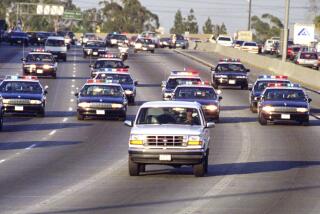Simpson Case Fallout Hits O.C. Criminalists
Forensics specialist Trish Sharkey was dusting a stolen car for fingerprints a few weeks ago when a curious tow truck operator walked up, peered over her shoulder and asked: “You gonna find O.J.’s prints on that too ?”
From crime scenes to courtrooms, the people who collect and test crime evidence in Orange County know they face far greater scrutiny and criticism in the wake of the O.J. Simpson trial because of the harsh spotlight it cast on their profession.
For Sharkey, the one-woman lab staff for the Orange Police Department, that has meant putting up with snide remarks that question her ethics and increased badgering from defense attorneys who were paying close attention to the tactics that helped acquit Simpson.
“Attorneys are certainly paying more attention to crime scene and evidence handling than they used to,” Sharkey said of her recent court appearances. “It presents a whole new side to try to attack us on our credibility and our work. It’s another avenue for them.”
Crime scene specialists and lab scientists say that while the increased attention does not faze them, it will likely add to the backlogs that slow down investigations at several levels. In some cases, extra tests will be ordered solely to deflect the questions of defense attorneys. “Just to head them off at the pass,” Sharkey said.
Alan Crivaro can attest to the attention given the Simpson defense tactics by his colleagues at the Orange County public defender’s office. Crivaro, the office’s DNA expert, said many young lawyers in the office approached him as the Simpson trial unfolded with questions about what strategies they might be able to draw on for their own cases.
Crivaro said he wouldn’t be surprised if defense attorneys across the country borrowed verbatim from the arguments of Simpson defense team member Barry Scheck, a pugnacious New York law professor who mounted withering cross-examinations of LAPD criminalists and told jurors the LAPD lab was “a black hole.”
“I’m 100% certain that will happen,” Crivaro said. “Lawyers will buy the tapes from Court TV or try to get those transcripts so they can see exactly what [Scheck] was going after. Some of those issues will be valid in other cases, some will not.”
But Dennis D. Bauer, Crivaro’s counterpart in the Orange County district attorney’s office, said he doubted that much of the Simpson arguments involving DNA would crop up in other cases because those specific tactics seemed to have little bearing on the verdict. Bauer contends the jury likely made up its mind about the case long before the DNA evidence was heard.
“People have put up with [Scheck’s] antics for years, but he’s never really had a clear victory on DNA,” Bauer said. “I don’t consider the O.J. case to be a victory against DNA. The jury never thought about the DNA argument one way or the other. If you are prepared [as a prosecutor], it’s all very unimpressive anyway.”
The Simpson defense team also blasted the handling of evidence before its testing, and that scrutiny may lead to redoubled effort by crime labs and field technicians to conduct their work in a way that is beyond reproach, Bauer said.
“Forensic scientists may be more aware now that they are in the middle of the process, between the collection and the prosecutors in the courtroom, and that every step of that process is important,” he said.
The impact of the Simpson verdict is not limited to the courtroom life of criminalists and crime lab employees. The acquittal also deepened a gloom that already hung over the budget-strapped Orange County sheriff’s crime lab, for instance, by making the scientists there question their profession’s role and reputation in the justice system.
When staffers huddled around televisions awaiting the verdict, a gasp ran through the crowd when the decision was read. Grumbling and shocked outrage followed, said lab director Frank Fitzpatrick.
“Many of the people here were incredulous because we understand exactly how powerful the evidence was and to see the jury just ignore that--well, many people here felt it trivializes what we do. A lot of people were just sickened by the whole thing.”
More to Read
Sign up for Essential California
The most important California stories and recommendations in your inbox every morning.
You may occasionally receive promotional content from the Los Angeles Times.









